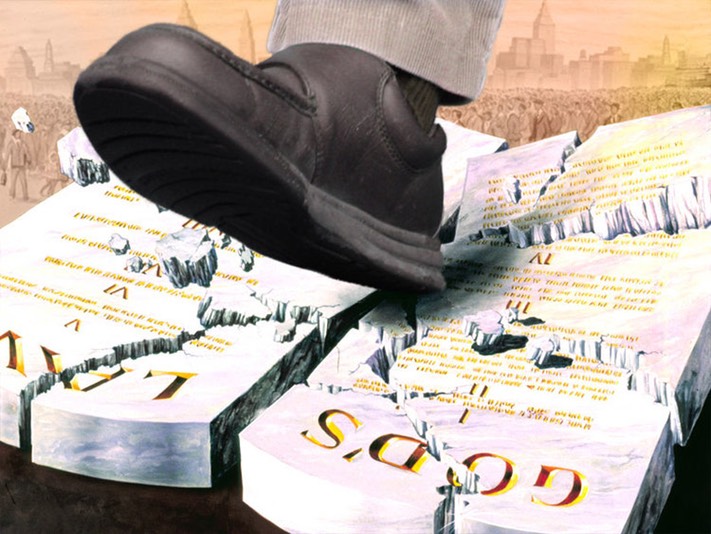God's Wonderful Law
Marcus L. Sheffield
Let’s face it, nobody really likes the idea of “law.”
Students in law schools may dream of using law to win a sensational murder trial. But most people jokingly agree with the Shakespeare character who says, “The first thing we do, let’s kill all the lawyers” (Henry VI, Part 2).

Human disrespect for law makes God’s attempt to save us much harder. His Law expresses how He wants our world to operate—whether life will be delightful or full of pain. Consequently, when He gave Earth to the first man and woman, He offered them the freedom to accept the sort of existence He had in mind. Freedom is key to God’s idea of the best way to live, of creating the best universe possible.
God did not give Adam and Eve a thick book of laws to memorize, or even the Ten Commandments. Instead, God placed what He called the Tree of the Knowledge of Good and Evil right in the middle of Adam and Eve’s home and said, “Don’t eat the fruit of this tree or you will die.” God could have put the tree on the other side of the world. No, the tree stood there in the Garden of Eden in all its luscious glory, but off limits to their taste buds. In other words, God was giving an open-book quiz with the right answer already marked.
Today, the great majority of humans would simply grab a piece of that fruit. The forbidden is attractive. We just have to look around the world to see the truth of that notion. But unlike us, Adam and Eve had no natural tendency to disobedience. The forbidden fruit lured, first Eve, and then Adam, into a rejection of God’s expressed will. Their sin indicated two things. One, they had freedom. Two, they didn’t want a world order founded on God’s principles. Unfortunately, they had no idea what the consequences of disobedience would be.

The enormity of this apparently little sin might be explained by analogy. My friends and I are at a restaurant. We’ve had a nice meal, and now it’s time for dessert. My friend Tim flips through the menu and excitedly notes one dessert with a big red line through it—“Do not select this dessert!” the menu warns. A death’s-head sits ominously in the margin.
We inquire of the waiter, “What’s wrong with this dessert? Why is it on the menu?” He replies, “The owner obviously doesn’t want you to choose this dessert, but he decided to leave it as an option. Management sees it as a matter of trust. We want certain kinds of customers—customers who have faith that this restaurant serves only healthy food. The dessert you speak of was poisoned by a former employee. You will die if you eat it.”
In effect, Adam and Eve ate that forbidden “dessert” in the restaurant and opened a door not only to death, but to horrors that cannot be comprehended by mortals. History, experience, and the daily newspaper tell us that there is no evil humans will not commit, all because of a foolish choice to eat “dessert” made with the fruit of the Tree of the Knowledge of Good and Evil.
Since a broken law was the reason death entered the world, a clear implication is that obedience is the path back to a perfect world. However, perfect obedience is no longer a possibility because, as they say, the horse has already left the barn. Every single person who ever lived is corrupted and fallen (see Psalm 53:2).
Restoration to the way things were so long ago seems impossible, logically speaking. But God had an idea, a plan, just in case. And simple faith in this plan is the only way back to the perfect world Adam and Eve left behind.
God’s Son, Jesus, was sent to our world to explain the Way back. Every act of his life clarified the so-called Plan of Redemption. Of all the stories about Jesus’ life and deeds, His healings are perhaps most helpful in explaining God’s method of saving us.
In Matthew 9:27-31, two blind men cry out for Jesus to heal them. Now unless these two men poked out their own eyes, their blindness probably had nothing to do with anything they themselves had done wrong. The possibility of physical blindness is simply part of a sinful world. He asked them, “Do you believe I can heal you?” and they said, “Yes.” The Bible bluntly proclaims, “And their eyes were opened” (ESV).
There it is! The way back to a perfect world. The blindness of these two men, a result of the first sin of Adam and Eve, is restored by faith. When we individually say, “Save me, Lord,” He answers, “Do you believe I can?” If we say “yes,” salvation occurs.
Faith is the key to salvation for a simple reason. We are lawbreakers—corrupted sinners. We’ve lost the power to obey in our own strength. Jesus asks human beings, “Do you believe I have the answer to the human condition? Do you want eternal life?” Our faith that Jesus can do what He says determines our eternal destiny.
Do we feel too weak and unwilling to obey God’s Law? Yes, of course we do, but the Book of Hebrews promises that God will “equip you with everything good that you may do His will, working in us that which is pleasing in his sight” (13:21, ESV). Do we believe God can do this? If we believe He can, He will give us the will and the power to obey His Law. In this way, we are restored to absolute perfection, by faith alone. We are counted worthy to be citizens once again of the ideal world God created.

Faith leads to many new attitudes and behaviors that we don’t naturally have. We can now say with King David, “Oh how I love your law!” (Psalm 119: 97, ESV). We praise God more and more because we begin to understand how much He does for us that we don’t deserve. Followers of God are happy and joyful in contrast to people who look on law keeping as restricting. We realize that “Your word is a lamp to my feet and a light to my path” (Psalms 119:105, ESV).
God’s people are not only enabled to keep His Law consistently, but their minds are also full of a new determination—“what more can I do?” They are eager law keepers. Those who hate God, on the other hand, are always looking for ways to break away from God’s “demands.”
When saved people learn that God wants them to do something, their first reaction is not, “What? Some new tiresome request?” No, if God says stop doing X, they want to stop doing X. If God hates something, they hate it too. Sin stinks of death, sadness, and misery. His people may not know how bad something smells to God, but they want to have his sense of smell.
In short, saved sinners have a new attitude toward law, an attitude long forgotten. And their obedience is actually thanksgiving rather than obligation. Thanksgiving prepares their hearts to receive even more of what God wants for them.
We need to stop fearing God’s Law. It does condemn our sin, but more importantly it makes us see our need of the simple faith of the two blind men. When God offers salvation from the penalty of a broken Law, we should take advantage of the gift by saying “yes.” This affirmation begins our eternal life, which will be an endless approach to ever-increasing unity with the Lord of the universe.

Marcus L. Sheffield is Professor of English at Southern Adventist University.